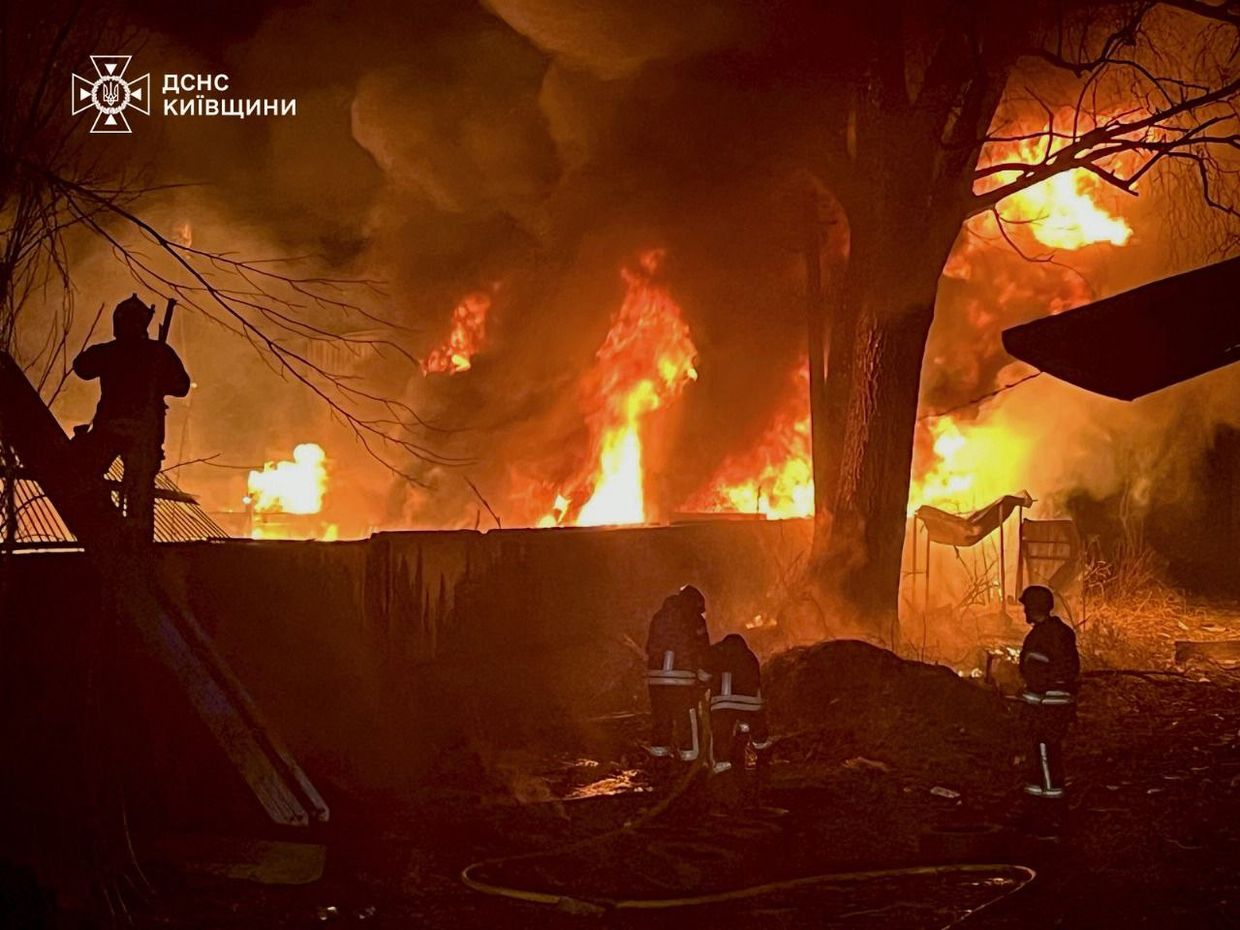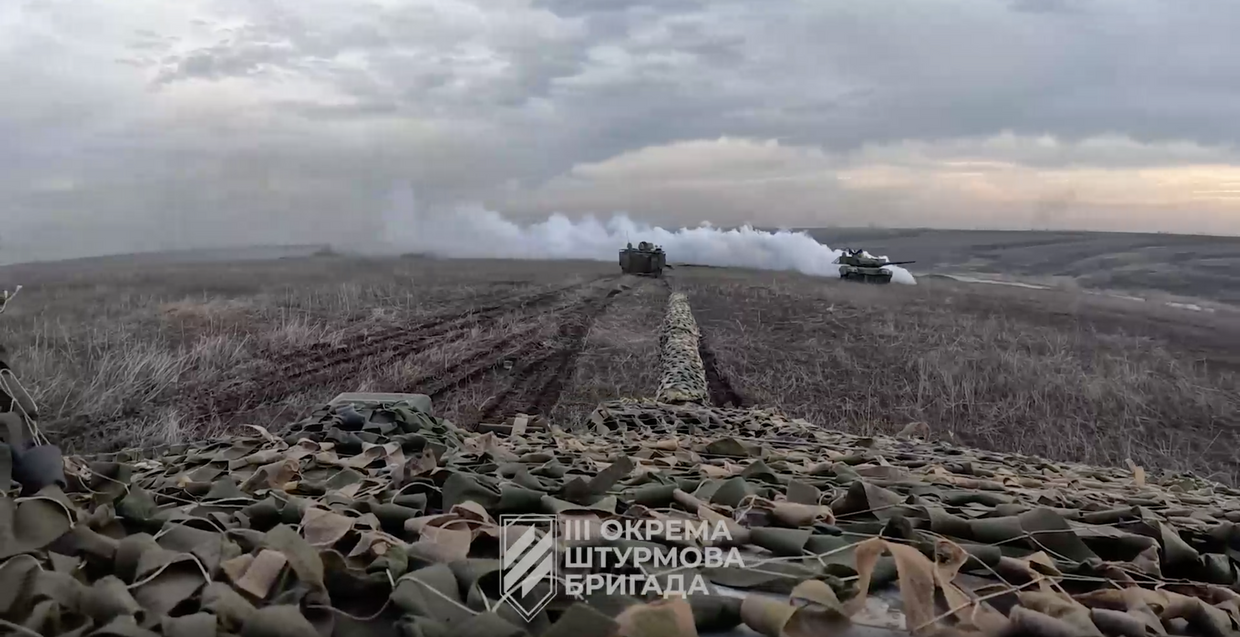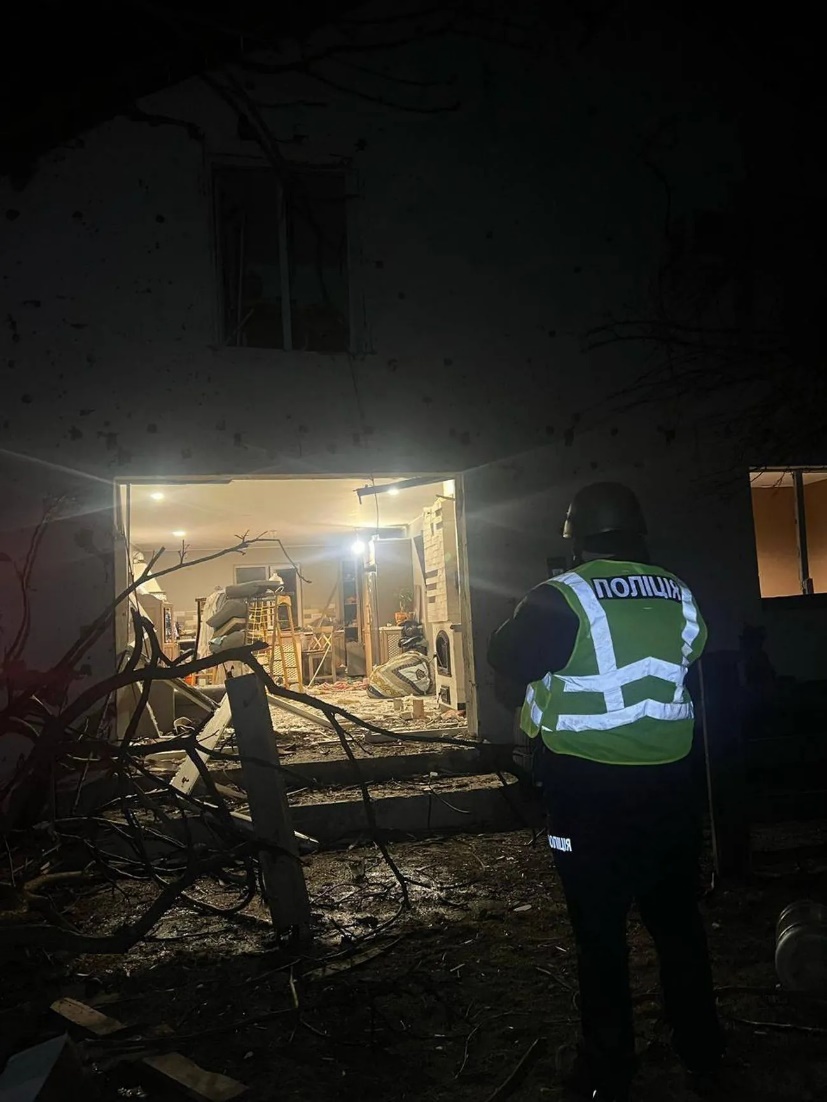As U.S.-Led Negotiations Open in Riyadh, Russia’s Aerial Assault on Civilians Raises Questions About Kremlin’s Commitment to Ceasefire
Summary of the Day – March 23, 2025
Diplomatic activity intensifies in Saudi Arabia while Russia’s actions on the ground continue to undermine professed peace efforts. A Russian drone attack on Kyiv killed a young family—a father, mother, and their five-year-old daughter—along with injuring ten others just hours before negotiations began in Riyadh. Ukrainian and U.S. delegations met on the evening of March 23, with Defense Minister Rustem Umerov describing the talks as “productive and focused.” Russian and American teams begin their discussions today as President Donald Trump claims he alone can influence Putin to end the conflict. On the battlefield, Ukrainian forces celebrated a tactical victory with the liberation of Nadiya in Luhansk Oblast, while successfully striking Russian troop concentrations in Toretsk. Europe continues preparations for a possible peacekeeping mission, with Czech President Petr Pavel announcing readiness to contribute troops once an agreement is reached.
Family Shattered in Kyiv: Russian Drones Strike Civilian Targets on Eve of Peace Talks
Russia launched an overnight drone attack against Kyiv on March 23, striking multiple residential buildings and killing three people, including a five-year-old girl and her father. The mother fought for her life for several hours but ultimately succumbed to her injuries in the hospital. Ten others were wounded, including an 11-month-old infant.
 A fire rages after a Russian drone attack on Kyiv. (Ukraine’s State Emergency Service / Telegram)
A fire rages after a Russian drone attack on Kyiv. (Ukraine’s State Emergency Service / Telegram)
Ukrainian Foreign Minister Andrii Sybiha condemned the attack, stating: “Russia’s systematic and deliberate terror against civilians contradicts its own statements about peace and undermines peace efforts by the U.S. and other partners.”
The Ukrainian Air Force reported that Russia launched 147 drones overnight across the country, with Ukrainian forces successfully shooting down 97. The previous day, air defense shot down 100 drones, and 114 drones the day before that.
President Volodymyr Zelensky highlighted the use of foreign components in these weapons, saying: “There are at least 102,000 foreign components in all these weapons… therefore, sanctions against Russian terrorists must work more effectively.”
These strikes occurred despite Moscow’s claimed agreement to a partial 30-day ceasefire on energy infrastructure. Since Putin’s announcement, the bombing campaign has continued unabated, raising serious questions about Russia’s commitment to any negotiated settlement.
Riyadh Roundtable: U.S. Conducts “Shuttle Diplomacy” with Ukrainian and Russian Teams
U.S. and Ukrainian officials conducted talks in Riyadh, Saudi Arabia on March 23 to discuss the parameters of a temporary moratorium on long-range strikes and a possible maritime ceasefire in the Black Sea. Ukrainian Defense Minister Rustem Umerov led the delegation, which included Presidential Office deputy heads Pavlo Palisa and Ihor Zhovka, Deputy Energy Minister Mykola Kolisnyk, and several military officers.
“The agenda includes proposals to protect energy facilities and critical infrastructure,” Umerov said. “Today, we’re working through a number of complex technical issues—our delegation includes energy experts as well as military representatives from the naval and air components.”
President Zelensky later characterized the discussions as “constructive and beneficial,” adding that “our team is working quite constructively, and the discussion has been very beneficial.”
The U.S. delegation, including National Security Council member Andrew Peek and State Department Policy Planning Director Michael Anton, is now meeting with Russian representatives on March 24. The Russian team is led by Grigory Karasin, Chairman of the Federation Council Committee on International Affairs, and FSB advisor Sergei Beseda.
Contrary to expectations of simultaneous meetings facilitating shuttle diplomacy, the talks are now taking place sequentially. The Kremlin downplayed expectations of any breakthrough, with spokesperson Dmitry Peskov stating: “We are only at the beginning of this path. There are difficult negotiations ahead.”
Ukrainian Victory in Luhansk: Forces Liberate Nadiya After 30-Hour Operation
Ukrainian forces successfully liberated the village of Nadiya in Luhansk Oblast, the Third Assault Brigade announced on March 23. The 30-hour operation reclaimed three square kilometers of territory from Russian occupation.
“Taking Nadiya cost the enemy two months of effort and resulted in two mechanized regiments—752nd and 254th of the 20th Russian army—being effectively wiped out,” said Andriy Biletsky, commander of the Third Army Corps.
 Armored vehicles in an open field near Nadiya, Luhansk Oblast. (Third Assault Brigade/Telegram)
Armored vehicles in an open field near Nadiya, Luhansk Oblast. (Third Assault Brigade/Telegram)
Nadiya, meaning “hope” in Ukrainian, is a small village located in the Svatyivsky district of Luhansk region with a pre-war population of just 25 people. The settlement has changed hands multiple times during the conflict—first captured by Russian forces in March 2022, liberated by Ukraine in October 2022, and then reoccupied by Russia shortly thereafter.
Geolocated footage published on March 23 shows Ukrainian forces operating in northeastern Nadiya, confirming their control of the settlement. A Russian source claimed that the loss of Nadiya on March 22 reveals persistent issues in the Russian 20th Combined Arms Army, including commanders submitting false reports about Russian advances.
Air Force Success: Ukrainian Strike Destroys Russian Troop Concentration in Toretsk
Ukraine’s Air Force struck and destroyed a concentration of Russian troops in Toretsk, Donetsk Oblast, on March 21, the Armed Forces General Staff reported. The attack reportedly “completely destroyed” the position of troops from the 1st Separate Guards Motorized Rifle Brigade of the 103rd Motorized Rifle Regiment who were hiding in a shelter in the city.
“Exact numbers are still being clarified, but the destruction of their shelter and personnel greatly diminishes the ability of the Russian military to operate effectively in the Toretsk axis,” the General Staff stated.
The strike eliminated multiple airborne assault groups and drone operators, significantly degrading Russian capabilities in the area. Toretsk, located approximately 20 kilometers southwest of Bakhmut, has been a hotspot of intense fighting in recent months, with the city now largely under Russian occupation.
Russia’s “Broken Vault”: Economic Pressures Mount as War Drags On
Unconfirmed reports suggest growing tension between Russian Central Bank Chairperson Elvira Nabiullina and the Kremlin over Russia’s wartime monetary policies. The Russian Federation Council Accounts Chamber reportedly initiated an audit of the Central Bank to investigate its monetary policy from 2022 to 2024 and the impact of high interest rates on inflation, budget expenditures, and investment.
The investigation is seen as an attack on Nabiullina, who has maintained the key interest rate at 21 percent—the highest since 2003—in an effort to curb inflation. Despite the Central Bank’s official inflation rate of 9-10 percent, independent analysts suggest the actual figure is closer to 20-25 percent.
Russian President Vladimir Putin has attempted to shift blame for rising inflation onto the Central Bank and Nabiullina, likely to draw criticism away from the Kremlin. The audit may be part of ongoing efforts to apply political pressure on the bank to prevent further interest rate hikes, manage business community frustrations, and maintain the narrative of Russia’s economic stability despite mounting evidence to the contrary.
Cash for Cannon Fodder: Russia Increases Recruitment Bonuses Amid Manpower Shortage
Russia is dramatically increasing financial incentives for military recruits due to a severe shortage of new volunteers, Ukraine’s Military Intelligence (HUR) reported. The Kremlin has raised signing bonuses to over 2 million rubles ($23,800) in several regions, with recruits in the Samara region being offered nearly 4 million rubles ($47,600).
“The regular increase in financial bonuses is a forced measure by the Kremlin, reflecting difficulties in filling military units,” HUR stated.
In July 2024, Moscow Mayor Sergey Sobyanin established a one-time signing bonus of 1.9 million rubles ($22,600) for city residents who join the military—roughly twenty times the average monthly wage in Russia, which stands at approximately 87,700 rubles ($1,044).
The recruitment primarily targets financially struggling individuals and youth susceptible to propaganda, highlighting Russia’s ongoing challenges in replenishing its depleted forces. Ukrainian and Western defense officials estimate Russian casualties at over 900,000 troops since the beginning of the full-scale invasion.
Czech Commitment: Pavel Announces Readiness to Contribute Troops to Peacekeeping Mission
Czech President Petr Pavel announced that his country is prepared to contribute troops to a European-led peacekeeping mission in Ukraine, following his meetings with President Zelensky in Kyiv on March 21.
“If there is a strong group of European nations willing to provide security guarantees to Ukraine, my strong conviction is that the Czech Republic should be among them,” Pavel said during a television interview. “We are part of this coalition now, and I believe that once we come to an understanding that there is a common will to deploy forces, the Czech Republic will be part of it.”
The Czech president emphasized that the “newly organized coalition of the willing” is ready to deploy a “stabilizing force” in Ukraine once a peace deal is reached. He also warned that Russia’s sovereignty over occupied territories should never be recognized, even if the conflict ends with a compromise solution due to Ukraine’s limited resources to liberate all areas.
“This conflict without changing the parameters will most probably end up with some compromise,” Pavel stated, “but I believe the compromise solution shouldn’t be recognition of occupied territories as rightfully Russian.”
Dutch Support: Netherlands Allocates €65 Million to Ukraine Energy Fund
The Netherlands has allocated €65 million ($70.7 million) towards the Ukraine Energy Support Fund, Ukraine’s Energy Ministry announced. The contribution will help repair critical energy infrastructure targeted by Russian aerial attacks throughout the three-year conflict.
“Thanks to these funds, we will be able to partially cover urgent needs,” Deputy Energy Minister Roman Andarak said. “A stable energy supply is a condition for the functioning of the economy, critical infrastructure, social and other spheres of life in Ukraine. We are sincerely grateful for this help.”
Since the beginning of Russia’s full-scale invasion, the Netherlands has provided Ukraine with 3,000 tons of energy equipment, including transformers, generators, and repair supplies. The energy sector will remain a priority for Dutch support going forward, according to Special Representative Erika Scholten.
The Ukraine Energy Support Fund was established in 2022 with EU assistance to repair critical energy infrastructure. The Netherlands joins other recent contributors including Iceland and Canada in providing financial support for these repairs.
Empty Words: White House Claims Progress Amid Continued Russian Attacks
President Donald Trump insisted in an interview on March 22 that efforts to end the war in Ukraine are “somewhat under control,” just hours before the deadly Russian drone strike on Kyiv. Speaking to the sports media outlet OutKick, Trump claimed he has had “very rational discussions” with Russian President Vladimir Putin.
“I don’t think there’s anybody in the world that’s going to stop Putin except me, and I think I’m going to be able to stop him,” Trump said. “We’ve had some very rational discussions, and I just want to see the people stop getting killed.”
The White House maintains hope for a broader ceasefire by Easter (April 20), according to Bloomberg, despite the failure of the limited energy infrastructure agreement to halt civilian casualties. U.S. National Security Adviser Mike Waltz told CBS News that prisoner exchanges and the return of illegally abducted Ukrainian children will be discussed during the Saudi Arabia talks as “confidence building measures.”
“President Trump has spoken to both leaders about prisoner exchanges. Both the Russians and Ukrainians exchanged prisoners, nearly 200, immediately following their call. And he’s also talked about the future of these children,” Waltz said.
At least 19,500 Ukrainian children have been confirmed as abducted by Russia since the start of its full-scale invasion, with only about 1,200 brought home so far, according to the Ukrainian government’s Children of War database.
Night Terror Continues: Russian Drones Target Kyiv Oblast Again
Russia launched another drone attack against Kyiv Oblast on the night of March 24, injuring a man and causing damage to residential and commercial properties, acting Governor Mykola Kalashnyk reported.
A 37-year-old man in the Fastiv district sustained shrapnel wounds to the abdomen, chest, thighs, and head and has been hospitalized. The attack damaged two private houses and sparked a fire at a commercial enterprise, which firefighters have since extinguished.
 Police officers on the scene after a Russian drone attack in Kyiv Oblast. (Mykola Kalashnyk/Telegram)
Police officers on the scene after a Russian drone attack in Kyiv Oblast. (Mykola Kalashnyk/Telegram)
This latest strike follows the deadly attack on Kyiv the previous night and represents a continued pattern of targeting civilians throughout Ukraine despite diplomatic discussions. Russian forces have increased their drone attacks on Ukraine’s capital and surrounding region in recent months, regularly launching dozens of attack drones towards Kyiv.
Looking Forward: Peace Prospects Remain Uncertain Amid Continued Violence
As technical teams discuss ceasefire parameters in Riyadh, the gap between diplomatic rhetoric and battlefield reality continues to widen. President Zelensky has called for increased international pressure on Russia to achieve a genuine ceasefire.
“Since March 11, there has been a proposal for an unconditional ceasefire, which would have stopped such attacks. But it is Russia that continues all of this. Without pressure on Russia, Moscow will continue to treat true diplomacy with contempt and destroy lives,” Zelensky said.
The upcoming days will be critical in determining whether the U.S.-led effort can bridge the wide divide between Ukraine’s security requirements and Russia’s territorial demands. European leaders, including President Zelensky, are set to meet in Paris on March 27 to discuss security guarantees for Ukraine, potentially offering an alternative path forward if the current negotiations fail to produce tangible results.
While diplomatic channels remain open, the continued targeting of Ukrainian civilians raises fundamental questions about Russia’s commitment to any peaceful resolution, suggesting that the road to ending Europe’s largest land war since World War II remains long and fraught with challenges.
